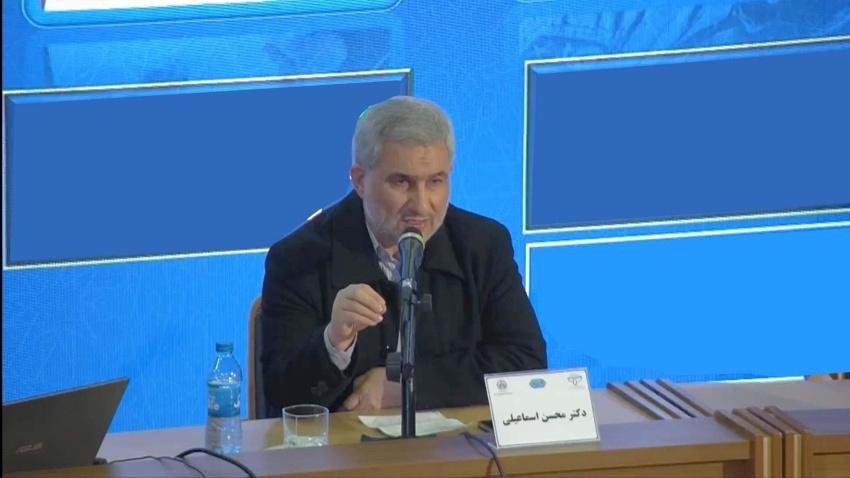The Theory of Citizens' Right to Moral Security Presented by Dr. Mohsen Esmaeili at the Supreme National Defense University

According to the Center for Communications and International Relations, the commemoration ceremony for Research Week and the unveiling of successful theories was held on Tuesday, December 18, with the presence of military and civilian officials at the Supreme National Defense University.
Among the honored theories was the "Theory of Citizens' Right to Moral Security," introduced by Dr. Mohsen Esmaeili. In his explanation, he presented comprehensive ideas that have been fully implemented, as detailed below.
In the Name of God, the Most Gracious, the Most Merciful.
We assert that we adhere to a comprehensive and responsive system that meets human needs at all times and in all places. For centuries, the concept of a fundamental principle has been established among Muslim thinkers and has been proven under the premise that no phenomenon in human life is devoid of a solution in Islamic law: hence, “The inadmissibility of events being devoid of judgment.” However, this valid claim has never been adequately explained or presented.
We perceive certain concepts, and at times, we present them to others. Similarly, we are shown proof of something, and at other times we demonstrate it to others. There must be a correspondence between proof and demonstration, and between existence and appearance. In today’s world, despite its shortcomings, the West has been more successful than us in terms of presentation. Unfortunately, we, as Muslims, have historically struggled in effectively showcasing our intellectual and scientific achievements. This weakness has caused significant harm to our faith, nation, and culture. A brief overview of this issue can be found in the late Martyr Motahhari's book "The Causes of the Tendency Towards Materialism," where he discusses how the distorted presentation of religious concepts has influenced youth away from religion. Martyr Motahhari candidly states that our contribution to the emergence of secularism is no less than that of Europe and the Church.
Even after the Revolution, we have continued to experience this weakness in properly explaining and presenting various concepts introduced by the Supreme Leader of the Revolution. One such concept is "moral security," which was introduced in September 2003. Unfortunately, no serious scientific work has been done on this theory, and its implementation has often been reduced to secondary instances, leading to incomplete interpretations that undermine its core idea. Doubts have been raised, sometimes framed as academic concerns, questioning whether security and morality can coexist.
At this juncture, I would like to express my gratitude to Brigadier General Hedayat Lotfian, who inspired these discussions in my mind. In 1998, when he was the Commander of the Law Enforcement Force, he asked me if there is such a thing as “Police Jurisprudence.” His question led me to write an article titled "Security and Sharia," which initiated these studies. Over the years, both scientific and experiential findings have been formulated into a theory.
Proving this theory can contribute to the development of the Shia security doctrine, allowing us to present it in contrast to various security doctrines worldwide. In contemporary security doctrines, the psychological aspect of security is often overlooked or given a marginal role. This theory argues that the mental and cultural dimensions of security hold primacy, supported by Quranic verses and our jurists' interpretations. This could serve as a distinguishing factor between us and security schools that primarily focus on the physical dimension.
Furthermore, the concept of moral security is not in conflict with international law; rather, it aligns with it. Much of our writing seeks to demonstrate that viewing this perspective as heretical stems from a lack of understanding of the relevant scientific foundations.
While we do not intend to base our beliefs on Western criteria, we argue that, even by those standards, our theories are defensible and actionable. With this premise, the current theory has been presented and, with God's grace, proven. However, it is crucial to heed its findings, warnings, and solutions.
I believe that "cultural security rights" is a more suitable term, aligning with global discourse. Nonetheless, for reasons of localization and adherence to commonly used terminology in our country, the current term was preferred. Within our religious and jurisprudential framework, all prerequisites for implementing this theory and achieving Islamic security have been established, emphasizing education, civil methods, and addressing factors like poverty and corruption in fostering cultural and behavioral anomalies.
In conclusion, I echo the wise words of the late Martyr Motahhari, who stated that ethical matters are inherently cultural and cannot be achieved through force or coercion. While governmental enforcement may occasionally be necessary, it should only occur in exceptional cases and by official authorities. Therefore, this theory does not align with superficial or questionable behaviors in this domain.
As outlined in the theory, now that it has been successfully validated, we must establish mechanisms to implement it, achieve its objectives, and hold various institutions accountable. It is incompatible with foundational intellectual principles to suggest that the police force alone should bear this responsibility. According to the document approved by the Supreme Council of the Cultural Revolution, at least 29 cultural and semi-cultural institutions are tasked with achieving the objectives of this theory, with the police force and judiciary being the final authorities in this matter. And peace be upon you, along with God's mercy and blessings.



Your Comment :